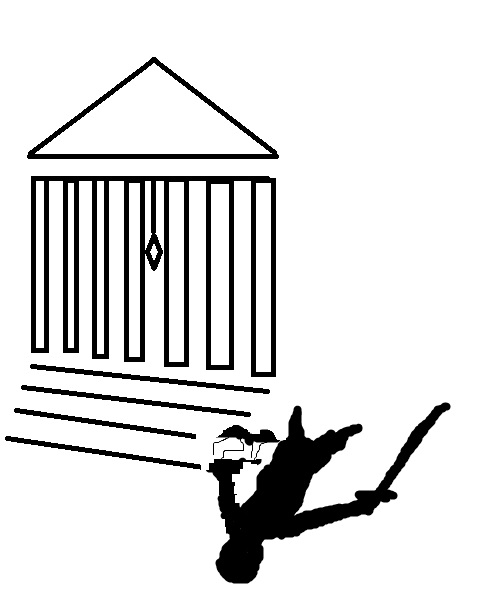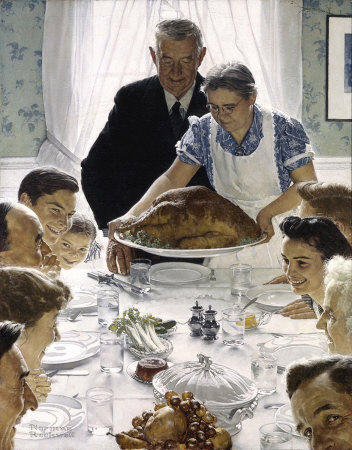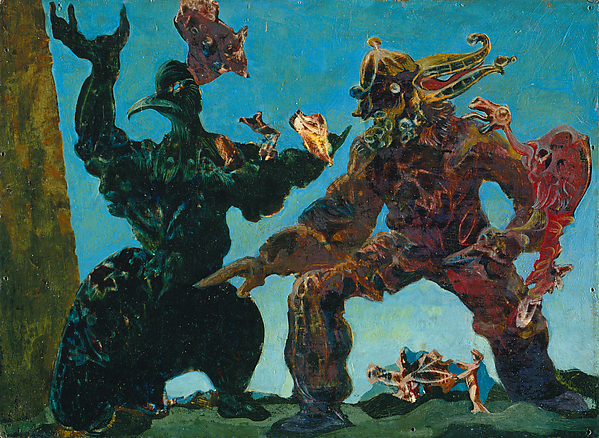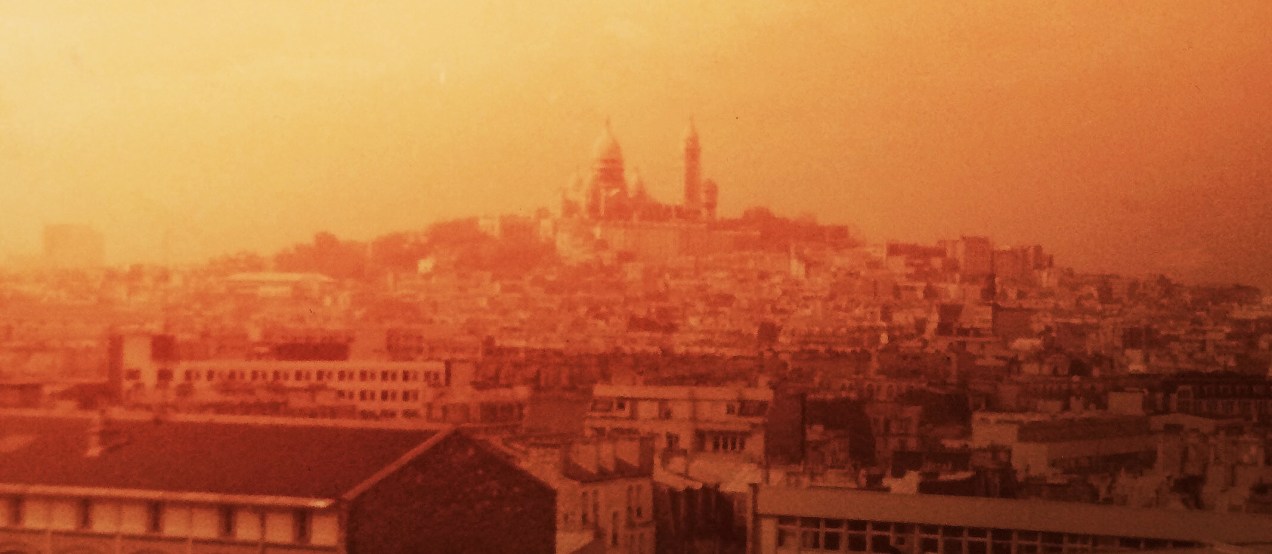“Travel is fatal to prejudice, bigotry, and narrow-mindedness, and many of our people need it sorely on these accounts. Broad, wholesome, charitable views of men and things cannot be acquired by vegetating in one little corner of the earth all one’s lifetime.”
–Mark Twain
When I was in college, in Columbus, Ohio, trying to recover from failed attempts in love and hating the 80s conservative mentality of making quick money, supposedly the only end in life, I thought maybe life was better in France. I might have idealized France, specifically Paris, from the images of its artists’ activities and gatherings in the 1920s.
In any case, Paris couldn’t be as bad as Columbus. Against my parents’ wishes, I used my bar mitzvah money to travel to Paris and try to finish college there.
Luckily, I had a list of contacts ahead of my trip and got in touch with a friend’s sister, who was in an undergraduate medical program in Paris. I took a cab with my things over to her apartment after she invited me to stay, while I looked for my own place and a job.
Catherine
Catherine was just a year younger than I was. She had golden hair and brown eyes, and spoke English with a British accent.
After offering me some food and we were talking, she said, “You’re cut.”
“What?” I said.
“Your pen-nis is cut. You’re Jewish,” she said with a grin.
I explained to her it wasn’t cut, exactly, and we talked about other things. She invited me to come with her to class the next morning.
She introduced me to some of her friends in the big lecture hall when we were seated. She pointed out others.
“She’s the most beautiful girl in the class,” she said, pointing to a young woman with dark hair and large breasts. There was a guy sitting behind us — she told me he was Jewish, like me.
“We’re the smartest,” he said to me.
Catherine told me she had another friend who spoke very good English.
After class, I met her friend she was referring to. He had left Iran to live in Paris some years earlier.
“You’re from America?” he asked.
“Yes,” I said.
“Why the hell did you leave?”
Then I explained something about the mentality in the U.S. and the economic policies that I thought would create an economic collapse.
“Yeah, I’ve met people like you from America. They all wear sandals and talk about their problems with their country.”
“Didn’t he speak good English?” Catherine asked me when we were leaving class.
“Yes, I guess.”
“Didn’t you think that girl was beautiful?”
“I thought you were the most beautiful girl in the class,” I replied.
That was in early December, 1988. My plan was to work as an au pair to learn enough French and then go to college. The friend whose sister I met and was staying with suggested I go with a tourist visa and switch it there, since I couldn’t get a student or work visa. Working as an au pair, I could get paid under the table.
Unfortunately, I soon learned that the only way I could change my visa was to go back to the U.S. first or get married to someone who was French. People who worked in the government agencies said, “your country does it to us.”
So I adjusted my plan to seek au pair jobs where I could get paid under the table. But the people I kept meeting kept telling me either they weren’t interested or that they didn’t think a guy would be a good choice as an au pair.
The holidays came and Catherine invited me to come with her to celebrate with her and her parents, in their home in a department in the middle of France. We took the train from Paris and then her father picked us up at the station when we arrived in the evening.
When Catherine walked me into their their home, Catherine’s mother was smiling at me. Both of them were looking at me, the interesting specimen brought home. I walked backward, a little shy, and knocked the dog’s dish. I looked down and said I was sorry.
Catherine’s mother starting laughing hard, saying “mon estomac!” Evidently, I made her laugh so hard she was in pain.
I celebrated Christmas and New Years’ with them, enjoying fois gras, boudin noir, oysters, cheeses, desserts and wines and liquors. I slept in the room of the friend I had met in Ohio. Writing about this now makes me feel a bit guilty for all their kindness that I was never able to pay back.
One of the times when we were shopping for the Christmas food, we drove into a valley to a small village. Catherine’s mom said she lived there as a little girl and remembered how the Germans hanged some people in the center square and how at night she was afraid to walk past their bodies left there on the ropes for people to see.
Also, during the time I stayed with Catherine and her parents in her home town, we went to a house of some of Catherine’s friends. They took out a Ouija board. Eventually, it seemed we had contacted someone from the afterlife who was mad about one of the people present.
“Porqoui,” Catherine asked.
“Juif,” was the answer.
Catherine asked who it was. The response was “Hitler.”
I laughed and said the game is all fake. I asked someone else to put their hands on the board and pointed out how the hands go where they want to go and questioned whether Hitler was really speaking from the afterlife, in French.
Then I asked who might have instead thought this up. Catherine? She smiled, but then didn’t acknowledge anything on her part either.
When we came back to Paris, Catherine set me up with one of her brother’s friends who lived in one of the suburbs.
I stayed in contact with Catherine. She had suggested I shouldn’t have a problem finding a job, since I was Jewish. I didn’t understand what she was talking about. But finally, out of desperation, I went to the Jewish quarter in Paris to look. Maybe some Jewish families preferred someone who was Jewish to work with and teach their children.
The Jewish Quarter
I remember talking to one guy there asking him for some information. He seemed a bit apprehensive of my mission. But then I found a synagogue the next morning. They were doing morning prayers. They asked me if I had been bar mitzvahed. I said I had, so they started fitting me with a tallit, a prayer shawl, and tefillin, leather wrappings with a wooden prayer scroll at the end.
Since I was a non-believer, this was even more of a burden for me to wear. I was still interested in meeting the people there. They invited me to evening services and then to Friday dinner at the synagogue. One of the guys I talked to told me he firmly identified as French. But this was a highly religious group, like Hasidics. One person said the only historical source we can trust is the Torah.
The rabbi was a man who appeared to be in his 80s or 90s. He had a problem when he walked, as if something were missing in his tailbone, and he had to move side to side. He had a long beard with traces of red, and he wore black clothing and a black hat. He spoke in a low whisper of a voice, so that he could only speak closely to people. He asked me in English where I was from, so I told him I was from America, from Ohio.
I ended up talking with someone who was studying there, at the Yeshiva. He had come from Los Angeles to study. He was trying to get me to study with him. In the evening, when we were talking outside as I was on my way back to where I was staying, we passed an attractive woman walking a dog. Their eyes met–it seemed that she was attracted to him and he to her.
“Just like a goy, walking her dog!” he said with scorn.
“What?! What do you mean?” I asked.
“One day you will know what I mean.”
When it became clear they weren’t going to help me find a family to work with — maybe they simply had no families making requests, I let him know I had to move along and search elsewhere.
He told me just before I walked into the synagogue, he had been praying and asked God to give him a sign. I laughed and told him it was just a coincidence.
The friend’s friend I had been staying with in the suburbs eventually told me I couldn’t stay any longer and I went to a budget hotel I found in the center of Paris. He felt bad that he had to kick me out, but he gave me a ride to the hotel and I told him it was ok, and that I appreciated his help — when I came back to the U.S., I sent him a little money to try to pay him back.
Student Budget Hotels
The electricity and heat to my room went out and when I went downstairs to talk to someone, there was a young woman, about my age, in a room with door with the blind pulled down. When I knocked, she peeked through the blind and motioned for me to go away.
The next morning, I went to where she served the guests the complimentary breakfast, but that was my last day there. I found another hotel in my budget travel book.
The hotel I found was called l’Hôtel de Nesle. I found it — this was before the Internet — through a budget traveler book called Let’s Go, France edition. It was in the Latin quarter, not far from the Sorbonne and a ten minute walk from Notre Dame. They put their guests with other guests, if they were traveling alone, which kept costs down. The owners were Algerian.
Breakfast was in their front room that looked like a luxurious harem from Morocco. The seats were little couches, full of cushions. The sweet smell of burning incense filled the room. And joyful Arabic music played on their radio.
Breakfast was a baguette with butter and a choice of fruity jams. You had a choice of tea or coffee, served in soup bowls. The first morning I chose coffee, which seemed strong and I could feel my heart beating fast. All the other mornings, I chose tea instead.

Sitting at the hotel front desk was a large woman with long black hair and lots of eye shadow. She took care of the guests and would ask each of us every morning, “You stay?”
If the answer was “yes,” to indicate staying another night, she would say, “Give me money.” The way she said “money” was accented in a funny way to English speakers. It sounded like “Munn’ -ee.” When she noticed my French was getting better, she started saying, “Mike, tu restes? Donnes mois l’argent.”
Her husband, a stocky, dark haired middle-aged man ran the hotel with her.
The breakfast room was always an interesting place. Student travelers from all over the world sat and talked. Some guys from West Germany shared some meat sandwiches with us. There was a female-female couple from the U.S. who had just come from Turkey, that they said they loved. When they left the hotel, they gave me something they didn’t need that they thought I could use — I can’t remember what it was now. There were a lot of people from Australia and Sweden — the Swedish people often spoke English perfectly, with an American accent.
I had a roommate for a while who was from Melbourne. We got along well and didn’t bother each other too much. One time at night she told me some jokes. I noticed that one joke/riddle was one people in the U.S. told about African-Americans:
Q. What do you call an Aborigine in a suit?
A. The defendant
It made me wonder whether the same social conflicts created the same problems, around the world.
Working for a French Family
Through looking at handwritten posts on a corkboard at the American Cathedral in Paris, I did eventually find a family. They needed someone who was willing to work far outside Paris, and they were tired of dealing with agencies. There was another American, a guy from Washington State, who would be leaving them soon and was training me on everything.
One of my first evenings at the dinner table I told them more about myself, that I was from a Jewish family, in the process of studying Philosophy at a college in Ohio, etc. When I said the word “Jewish” the mother, who was from Brussels, let out a sound, like something was wrong.
The father worked in business insurance. Philosophy seems to have a respect in France as an academic field that it doesn’t necessarily always have in the U.S. So when I told him what I studied, he seemed to respect it but also suggested he was doing something more relevant and practical for the hard world we live in.
One evening, when their little girl and little boy was in bed, the adults played Trivial Pursuit, French version, so that the questions were geared toward France. I won. They were impressed that an American knew so much about France.
Another time, the American au pair wanted to play me in chess. The mother helped him, suggesting moves, so that I was playing both of them. I took every one of his pieces and got him in checkmate. He seemed to be a little angry with me about that.
The American au pair who was leaving and the family both had a conservative bent. I remember one time I was telling them a story about some Arabs I was speaking with, and how they told me France needed the Arabs. He later told me not to mention Arabs to the family.
Sometimes the father also made disparaging comments about gay people and black people.
Both the children were resistant to having someone besides a parent taking care of them. The American told me he had to deal with this for a time. The girl, Jennifer, was three and the boy, Guillaume, was six. One time at dinner I mentioned that I was having trouble taking control of things with Guillaume.
The father became agitated and said I wasn’t to have any sort of control. He explained that as long as the boy wasn’t breaking any of the father’s stuff, I should let him have what he wants.
Another time, I checked on Jennifer when she was sleeping, making sure she was ok. I told the American I just checked on her. He said I shouldn’t do that, that I should wait until she’s up and out of her room instead of checking on her.
At some point when I left their house, maybe it was a weekend I got a chance to get away and go to Paris, I spotted a mezuzah in their doorway. Another time, in the garage, I found a bunch of books in a box by Emile Zola. I wondered if something had gone wrong in the deal the family had made with the previous owners, who were probably Jewish.
When the American left me on my own with this family, I was pushing Guillaume on the swing, and he kept asking me to push him higher. I remembered what the father said, so I didn’t want Guillaume to report me to his father. At some point he was upside down on the swing, but I caught him. I laughed and this made him angry – he didn’t want me in his house.
I feel bad about this now. He was very little and I should have understood better how hurt he must have felt.
Another time, when Jennifer had gone to her room for a nap, I went outside where Guillaume and the mother were.
“Is Jennifer sleeping?” she asked.
“I think so,” I said.
Later, she asked me the same question and I gave her the same answer.
That was enough for them and they fired me. They told me I was being sent out the next morning. This was a lot for me to hear, since I was also losing my home. While the father said some flattering things about what a bright future I had, I replied with some vulgar comments.
The father’s sister, who was from the south of France, was there too. They were all disturbed with what I said, after they all had it translated.
The next morning, I had some items that I tried to sell to them, since I didn’t know what I was going to do for money any more.
“But you’re Jewish,” the sister said. “You don’t have to worry.”
The father took me to the train station and gave me 50 Francs, which converted to $7.50 at the time. When I got to Paris, I had to ask my parents for some money.
Back at l’Hôtel de Nesle — Saving Money
I went back to l’Hôtel de Nesle. I had to find something different. I could never work and live in the same place. I had to find an apartment first, and then a job.
As I was running low on money, it also happened that the hotel had a group of female Japanese students staying with them who said they could not share a room with a male. The people running the hotel asked me if I could move from my room for a few days and sleep downstairs in the front room at no charge. I, of course, agreed. My duties there included feeding the ducks in the courtyard and making the coffee, an extra strong Turkish coffee that I boiled on the stove.
Then I discovered that there were student restaurants all around the city, where I could use my university ID, even though I wasn’t going to school in France, and eat a good meal for three Francs, $.45.
I met a lot of different students at one of the restaurants where I used to eat. I met two Italian blondes who both seemed attractive to me. One of them thought I was funny. I had trouble with their names and introduced them to someone else as “Francesca and Franscheska” — that wasn’t correct, but she imitated me and laughed. One time I told her I heard in Italy the government was doing something about the mafia! She laughed, saying, “the government is the mafia.”
The Swedes
I ended up staying at the hotel for over a month as I looked for a place. One day a thin golden-blonde woman, a bit older than I was, walked into the main room as we were all having breakfast. She had a big smile on her face and she grabbed on tight to the hand of the man who ran the hotel, keeping her warm smile. She was part of a whole group of hotel artists guests from Sweden.
I later found one of them dancing by herself in the hotel courtyard. I asked her, “What do you do?”
“I dance,” she responded.
Another morning, the woman with the golden-blonde hair was in the room where we were having breakfast, saying she had wishes boxes. I told her I had a wish for an apartment.
“I will put it in my wishes boxes.”
I didn’t really believe it would work.
However, a few days before, in the evening when I was having dinner in the student restaurant, I sat across from a guy with dark hair and we made conversation with the French that I could manage. He said he was studying there and I mentioned something about looking for a place. He looked at me like he had a secret and said he might know about something.
When I got up, he gave me a slight tap, as if to remind me about the secret. So I saw him again in the restaurant that day and he asked me to come with him. We rode the subway together to his place in northern Paris. It was one room at the top floor in an otherwise nice apartment building, with its winding staircase and red carpeting. For the single rooms at the top floor, there was one shared bathroom, with a Turkish toilet, a hole with water that one flushed with a chain handle.
Yusuf was his name and he seemed likable. I told him “Je t’aime” — in French, as far as I know, there is no way to differentiate between “I love you” and “I like you.” So I tried to explain what I meant and he laughed. We put an agreement on a handwritten note and I agreed to move in the next day.
I had missed most of the art show that the Swedes had hosted in the hotel’s basement. It was an autobiographical photography exhibit. They held photo books open. It included details of a guy’s motorcycle accident and his recovery.
I was sorry to have missed the show, but I let the woman with the golden-blonde hair know I got an apartment and she was happy for me.
Red Light District
I still had to get a job. I was looking through ads and spoke to someone named Marie Helene. I agreed to meet her in the evening.
The area seemed quiet, less lit and a little dirty.
I buzzed the apartment number and I was buzzed in. When I got upstairs, a woman let me in and I found myself standing in front of a scantily clad blonde haired woman doing some ironing.
“Is Marie Helene here?” I asked.
A bit irritated, in English, with an American accent, she said, “No, she’s not here.”
I was confused and said, “but she said she wanted me to come this evening for the interview!”
“Oh, just a second,” she said.
Then a scantily clad woman with dark, wavy hair and black horn rimmed glasses came downstairs. She introduced me to her son, a toddler who looked like his father was probably Arab. She also showed me a small one room apartment on the floor below where I would live when I worked for her. But I told her I preferred to have my own place.
Later she would tell me, since I didn’t want to live there, “Il ne marche pas” (“It doesn’t work”).
My next thought was to see if I could switch my visa by enrolling in school. My travel visa was only good for three months. I had visited a government agency, where someone told me I could leave and come back right away. Perhaps when I was outside the country, I could switch my visa.
I ended up going to London to make my arrangements.
London
I found a budget hotel in London and I sent some mail to some French learning centers regarding registration. I got in touch with a friend I had known in junior high school who was studying outside London, and I asked him if I could use his address to receive some things.
At the hotel where I was staying, I met a French guy around my age who complained about Arabs preaching in the middle of city squares, coming to his country and calling others ‘infidels.’ He said he had enough of elected government giving into them.
“Then what kind of government do you advocate?”
“You see my ring?”
I looked at his ring and saw the symbol of the French monarchy.
“You’re crazy!” I replied.
“I believe in older ways,” he said, or words to that effect.
My stay in London lasted for over three weeks, and I thought I would only need a few days. However, I heard nothing from the schools. I was running out of money and had to go back to Paris. When I returned, I discovered the schools had been closed for Spring break.
Back in Paris
At this point, I had to ask my parents and grandparents for money. It was getting embarrassing. My roommate was away, and I survived on what we had bought earlier. We had no refrigerator, but there were some foods that could stay a while. We had one hot plate for heating food.
I had to go to the bank to see what was happening with the money my parents had wired. But I had no money for the metro. I watched a lot of the Arab kids who were jumping the turnstiles, right in front of subway employees who wore uniforms and were greeting people with smiles. The trick was to keep your body level and move your legs up. I managed to do it and got to my bank.
They said there was no money and I said it couldn’t be true. I knew the money was wired. I raised a big fuss. Eventually, someone asked me how much I needed. I said I needed 4oo Francs ($60.00), and he wrote me a slip that I used to present to a window where someone gave me that amount, which would later be deducted from my account.
As I waited for the money to arrive, I lived on less and less of the food we had left, which mainly consisted of instant potatoes. I saved money from buying toilet paper and used an old newspaper. But one day I was back in my room after using the bathroom and someone pounded on my door.
I opened the door and an older woman whose job it was to clean was screaming at me with pieces of the newspaper I had just used in a bucket. I didn’t understand what she was saying, but I knew she was mad.
My roommate finally came back and I got to know him a little better. He was from Algeria and he spoke only Arabic and French, so I was forced to get better at French. Sometimes he would talk to me in the morning, after I had been dreaming all night in English. So I had trouble understanding him at first. I had to warm up.
He could see I had no money and I was hungry, so he gave me some money to buy food every morning. And I later paid him back when I had money.
Soon my roommate heard from the landlord. It turned out that he wasn’t supposed to have a roommate and I was to be out. I was furious. He hadn’t told me anything about that. He said it was my fault for clogging up the toilet with newspaper. He had a discussion with the landlord, and it was decided that I could stay.
Leaving Paris
Finally, the money arrived, but I was ashamed that I had to ask. In some ways, it seemed like I was starting to survive. I was going to be able to enroll into a school and change my visa. Still, my living situation was hard. I had to squat over a hole when I had to poop. To shower, we used a portable system with some hosing that we hooked to the sink.
I just wanted to go home at this point. I told my parents I was going to come back. They were so happy they gave me money for my ticket and even sent me enough that I had a little extra, so I decided to enjoy myself with the time I had left.
The apartment was near a beautiful park called Buttes Chaumont.

Hill from Buttes Chaumont

Benches from Buttes Chaumont
Unfortunately, this area would later get a different reputation, as I was surprised to later read.
There were more Arabs living in this part of Paris, but when I lived there, the neighborhood was still mixed. One evening I was coming home on the bus and an Arab woman sitting next to me was smiling and starting to stroke her leg next to mine. Obviously, some of the Arab immigrants weren’t very religious.
As my time was running out, I felt free to speak my mind with my roommate, while I respected his rituals and even enjoyed Ramadan with him. And you can read more about my experiences here. However, I let him know my skepticism about religion in general. He insisted God had to be real. It was always a respectful conversation, even if it was passionate at times. I learned to appreciate people, even if I don’t agree with all of their practices.
He sometimes spoke about America with scorn, and he would end his statements by saying, “and it’s run by Jews!” conveniently forgetting my identity. But he also seemed to have a love for the U.S. We both laughed at and enjoyed a Levis commercial. At the end, a voice over stated, “on est jamias trop Levi’s” (“One is never too Levis.”) It was interesting to see the U.S. from the outside, and to see the U.S. the ways others saw it.
Epilogue
My roommate was a good friend to me. And it was hard to say goodbye when I finally left. I would later meet more Muslims or Arabs when I returned to the U.S. Some I liked and some I didn’t. I met one guy who said he was from Lebanon, but later told me he was Palestinian, that he was in the PLO, and that he helped the U.S. troops evacuate from Lebanon.
After the first Iraq war, I met a few people from Pakistan and a guy from Yemen who had nothing good to say about the U.S. The Yemeni guy said, “George Bush [George Herbert Walker Bush] drinks blood,” so that I found myself defending a president I didn’t always agree with.
My experience has showed me that the Muslim and Arab world is complicated, with many points of view and variations in religious practices. And even if we don’t agree with people on everything, we should still understand how some of their practices work for them. And disagreements shouldn’t have to be a reason to kill people.
Some people are obviously easier to deal with than others. But, such as with my roommate, there was a perception of disrespect, not all of it incorrect. He would come home and lock the doors nervously, not without some reason to do so, since there had been incidents where gangs had murdered Muslims.
There is a feeling in the Muslim world that people want to harm them simply because they are Muslim. I’m not defending the fanatics who want to kill people who don’t practice as they do. But there’s room to consider how some situations help radicalize people who might otherwise be more tolerant, when people feel they are under attack.
As a Jew, who’s met people from both sides of the Palestinian-Israeli conflict, I understand the real tragedy, that there are decent people (and horrible people) on both sides. Both sides have reasonable complaints from the other. Hopefully, one day, the killing will stop, and people will find respectful ways to sort out the disagreements.
I understand the land disputes are complicated. And the legacy of colonialism makes the knot even more complicated to unweave, as each side insists on ownership in a place whose rulers have been shifting for millenia. My point is simply that people on each side see the humanity in the other.
Seven years after leaving Paris my roommate called me. He left a message at my parents’ house in French. They didn’t understand it, but knew it was for me. I called my roommate back. I heard someone else talking to him in the background. At that time, Algeria was in a civil war. I was wary of having too much contact with him at that point, since it was strange not to hear from him for seven years.
If he did get involved in something, I still see the humanity past all the conflicts that might exist. It doesn’t mean I agree. Maybe some day seeing the humanity in each other will help us past our disagreements.








 reedom. Maybe it’s activists and journalists and some entertainers, but also the rest of us with the courage to put ourselves at risk to speak out and hold people in positions accountable, before we all lose that power.
reedom. Maybe it’s activists and journalists and some entertainers, but also the rest of us with the courage to put ourselves at risk to speak out and hold people in positions accountable, before we all lose that power.





























